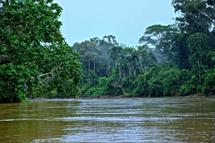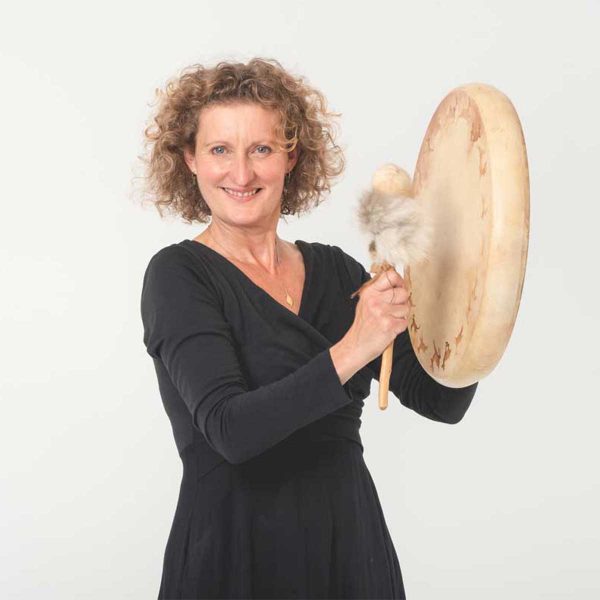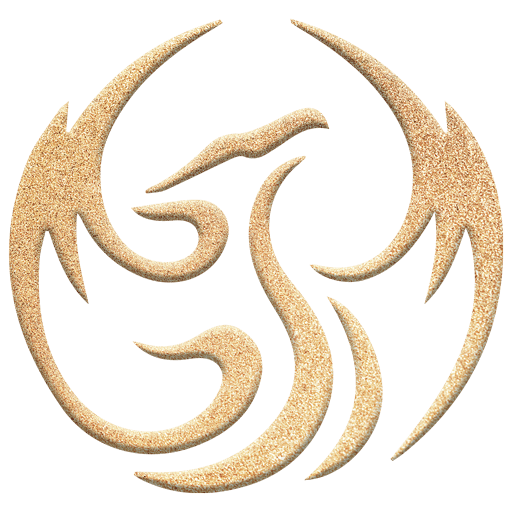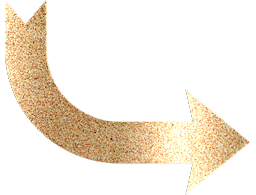In a village called Tinkias, deep in the Amazon Rainforest, there lives a very, very old, tiny, wrinkled, shiny eyed grandmother. She is a mistress of the ancient art of spinning cotton, and the only one in her village who still knows how to do it. This is how, in the past, the women would create the thread that they would later weave into cloth for their families.
Whenever we visit she shows us how to spin and then helps us, laughing as we try. Even though she can hardly see, her thread comes fast and is so fine, even and perfect, it’s extra-ordinary. In contrast ours are bobbly, uneven and break. Of course it takes the practice of many years to become as skilled as she is.
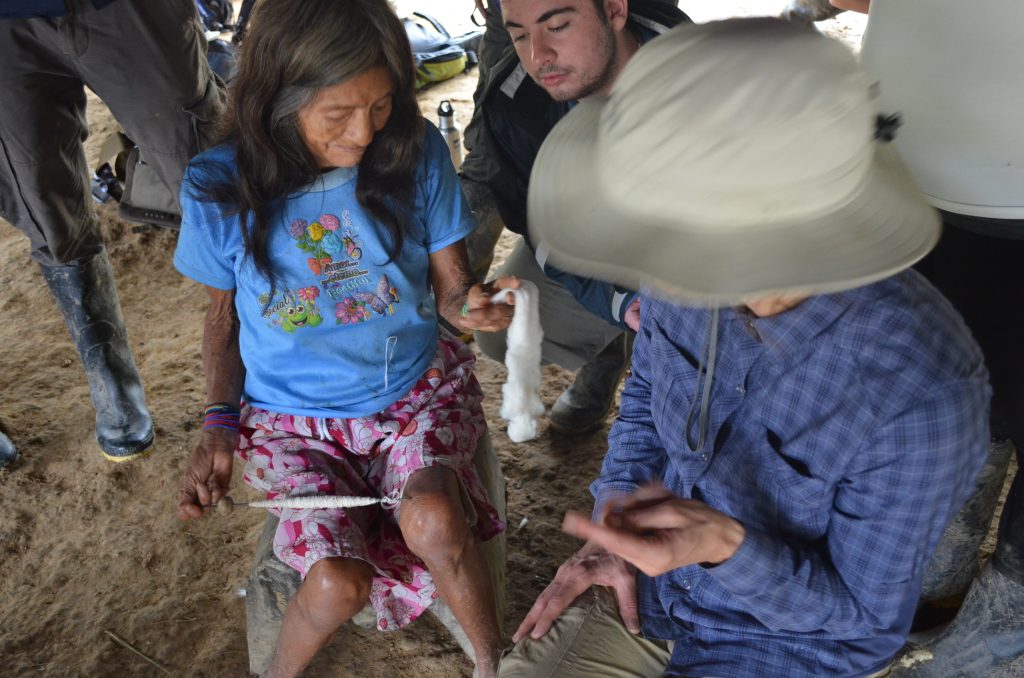
As, one by one, we earnestly try our hands at spinning, I find myself aware of her great age and the history she must have lived through. I ask the translator to ask her if there is anything that she’d like to share with us about this. The translator, a strong young Achuar warrior, bellows in his great grandmother’s ear so that she can hear him. She replies immediately as if this story had been preparing itself within her, just waiting for the right moment to be told:
“Once, when I was a young woman, I was walking in the forest with my husband. He was a very fast walker, and I often couldn’t keep up with him. Mostly he would wait for me, but on one journey, we lost each other. I couldn’t find him. When darkness came I made a shelter and that night, alone in the forest, I had a dream. I dreamt that the time would come when people from all over the world would visit us here in the forest” she looked up at and smiled “and now, you are here”.
It was a new perspective for me to realise how extra-ordinary that vision must have been for a young Achuar woman in the middle of the Amazon, maybe 50 or 60 years ago.
Her dream has come true and she was delighted about it.
The following day I remember a vision of mine: “I am flying above the Amazon rainforest. Below is a snake of people singing and dancing through the forest; people of all nations, all ages, all colours. It’s us, the people of planet earth.” I realise that, though this vision is not yet fully realised, it’s no accident that I am singing and dancing with people from all over the world in the Amazon.
This vision, which I had when I was 25, opened the door for me to see dance as my ‘path with heart.’ This led me straight to Gabrielle Roth and for this I will always be grateful. That was nearly 3 decades ago. Since then I’ve been following my heart with Ya’Acov my husband and partner in life and love and daring to dream. In 2007 we established the School of Movement Medicine. Thanks to our collaboration with the Pachamama Alliance I came to this meeting with the beautiful Achuar grandmother spinner of threads, and the weaving of our dreams.
Dreams are very important to the Achuar. They get up before dawn every morning, and gather round the fire to drink large quantities of Guayusa tea. This tea is made from a forest plant and has a gentle caffeine-like effect and tastes like green tea. Having filled up with several gourds of Guayusa, they go to the edge of their forest clearing and throw it back up to cleanse their systems. It sounds uncomfortable but I’ve found it surprisingly refreshing and clarifying. Then the Achuar sit down to share and interpret their dreams. Through their 'dream guidance system' they decide what to do each day.
21 years ago, in 1995, the Achuar shamans began to see, in dreams and in visions, the grave threat of oil exploitation coming closer to their lands. Core to Achuar cultural beliefs is to move towards that which scares you. An Achuar shaman called Rafael Taish did just that and reached out to the modern world calling for allies. He was heard and answered, and the Pachamama Alliance was born. This group included Bill and Lynne Twist.
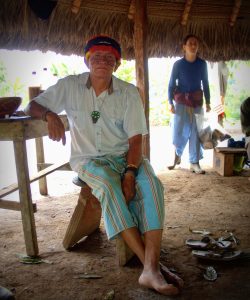
The Achuar asked the people from the USA with whom they formed the Alliance to do two things: 1) To help them to protect their forest and 2) To change the 'dream of the north'.
Since then the Pachamama Alliance has effectively supported the Achuar to self organise, to map their territory and to gain legal ownership of it, and with discernment, to choose what comes into their territory and what does not. The biggest validation of the effectiveness of this work is that, until now, the territory remains pristine and unexploited.
The other wing of their work is the 'Awakening the Dreamer' symposium which is where Ya’Acov and I started off on our Pachamama Alliance journey. This work has touched us deeply and affected our lives profoundly. Don’t do it if you want to remain as you are!
The symposium is a powerful tool to awaken each of us to play our own part in changing the ‘dream of the north.’ The ‘dream’ means the ‘story’: the unexamined assumptions which so powerfully unconsciously condition our perceptions and our choices. I find its philosophical, historical, psychological and spiritual perspective to be deeply intelligent. I have been part of so many symposiums, yet, whenever I do another one, I find myself touched all over again, and I learn something new. I recommend doing one as soon as you can, and then again! If you did a symposium a while ago you’ll find that it has now evolved, as they keep updating it. You can now take it as symposium online: 'Awakening the Dreamer' and you can follow it up with the Game-Changer Intensive.
Something we have only just realised is how unusual it is for NGOs to commit to long term funding to enable indigenous people to organise and empower themselves, as well as working on the roots of the problems in OUR world. Most NGOs fund particular projects which run for a few years and then stop. This is very different from the Pachamama Alliance’s way of being and doing. I find myself so proud to play my part in supporting this alliance of indigenous and modern wisdom.
As other neighbouring tribes see the power and respectful way of working inherent to this Alliance they want to be part of it too. So the Pachamama Alliance, until recently working as 'Fundacion Pachamama' in Ecuador, has now got a bigger remit and a more diverse group of indigenous peoples with whom it is working, many of whom are former enemies. This expansion includes the more recent alliance with the Sapara, whose leader Manari has now come to the Summer Long Dance twice.
Manari has told us that the experience of the Long Dance has supported him and his people by letting them know that there are other people in the world who dream as they dream. This means that they feel less alone. Manari says that at the Long Dance he’s been able to contact his spirits in a way which he normally can’t do when he is out of the forest. This has touched us so much and has given us an important mirror of our work from an indigenous leader who we trust.
Manari with us at the Long Dance
In December 2013 the government of Ecuador closed down the Fundacion Pachamama –another reflection of how effective this organisation has been at supporting indigenous rights. Undaunted, the work continues under the leadership of Belen Paez; renowned indigenous rights advocate and woman of such heart, soul and brilliance.
At a recent meeting in the forest the shaman Raphael Taish was speaking with Bill Twist and asking him how long the Achuar could count on the Pachamama Alliance’s support. Bill said: “The next hundred years, something like that” and assured Raphael of their long-term commitment. The relief was palpable. Belen was there with them and she told us how moving it was to hear this exchange.
Manari is a man of compassion and spiritual understanding whose reflections have helped me personally over the few years in which I have known him. His wisdom and understanding helped with my grieving for my mother, and he has helped me understand and receive the medicine of several mysterious visions I have had.
This same generosity of spirit was in evidence during our recent visit. Two weeks before we arrived at Naku (the Sapara people’s eco-project) the Ecuadorian government had signed an oil deal with brutal implications for their forest and his people. He was in existential shock and in deep inner and outer preparation for what was to come. In this context, the quality of care and attention he still gave each individual for their own personal life journeys was mind and heart blowing. Here he is speaking on the day that we left.
The situation now is very hot. One front line of the confrontation between the ‘extractivist mentality’ and the ‘sustainable dream’ has moved to Sapara territory: 1 million acres of pristine rainforest, rich with bio-diversity, medicinal plants, several cultures and a huge carbon sink for the planet.
This is a difficult and complex issue. I sympathise with the Ecuadorian government’s predicament. In the last years they have borrowed a huge amount of money from China to pay for improvements to the country’s infra-structure (roads, schools, hospitals) that are widely appreciated in Ecuador. Oil is what the Chinese want in return. Given our situation on planet earth, it is clear that there HAS to be another way, and indigenous people across the planet are leading the way to say “NO” to the resource grab which is (literally) consuming our planetary and future well being.
In January 2016 the government of Ecuador sold the oil rights to 'Blocks 79 and 83' to Chinese oil companies. These areas of pristine Amazon rainforest are home to the Sapara people, as well as the Kitchwa from Sarayaku, Tagaeri and the Taromenane indigenous groups who are living in voluntary isolation.
This was done despite Ecuador’s constitutional commitment to the ‘Rights of Nature’, despite the fact that most of the people living in these areas were not consulted or informed (which is the Ecuadorian law) and do not agree to this, despite the Paris climate accord of 2015 and despite the Sapara culture having been designated as a site of world heritage by UNESCO in 2001.
The majority of the indigenous people are very clear about their response. They are saying “No!” loud and clear, and their commitment is unshakable. They are not saying; “Please do not come into our territory”-- they are saying; “We will not allow this.” To meet such empowered, strong and yet profoundly gentle people, who know who they are and what they are standing for, and that they are doing this for the whole planet and for the future of all of our children is a total blessing.
A couple of years ago Augustine, the young Achuar leader who some of you will recognize from this video, said: “Our ancestors foresaw that this time would come and that the forest would be threatened. And they saw that the forest would stand, because we would reach out for allies and we would not stand alone to protect it.”
Domingo, one of the visionary Achuar who stands behind the young leaders like Augustine says: “The prophecy is that this is the time when the eagle and the condor will fly together in the same sky: it is the integration of the best of indigenous wisdom together with the best of modern knowledge that is going to pull us through. We need each other.”
In our recent journey, what both we and the people we were visiting saw in vision or dreams over and over again is that it is the web of interconnection, solidarity and of love between so many of us; people from the forest and from the whole wide world, standing together, that will hold the forest safe. The Pachamama Alliance think that there are another two or three years to go until it will be unthinkable to do something like try to take oil from under the rainforest. So, if, between us all, we can hold the line ‘till, then', we may reach the other side with the forest intact. You can have a role to play in this if you want. (Keep reading!).
One of the extra-ordinary things about this time is the role the women are taking. In the jungle, differentiation of gender roles has been pretty clear ‘til recently, with the women in the background when it comes to contact with the outside world. Now, however, the women are choosing leadership roles and are working together to make a difference. On International Women’s Day 8th March 2106, the day that the oil companies had said they would enter the territory, 500 Amazonian women of 7 nationalities demonstrated together in Puyo. The oil company did not enter the forest that day.
As I read this article, I wept with gratitude and joy. As Belen Paez said: "It's a unique and historical moment to have the experience of solidarity and connection between indigenous women and activists from all over the world standing up for the rights of the Amazon rainforest and its people, we have all been waiting for this moment for so long, and that moment is now."
I am reminded me of Nelson Mandela saying something like: "It always seems impossible until you've done it". Not that it’s over, but this is an important step.
We made this film of Manari on 22.02.2016 and here are some others we have made over the last couple of years. Please do share them with your networks.
Videos:
Manari
The fierce passion of a young Achuar leader
Maria speaks
Mukasawa Speaks
Jose Speaks
Jorge Speaks
Also, do watch this very short film wishing Amazon Watch “Happy 20th Birthday”. Amazon Watch works in beautiful collaboration with the Pachamama Alliance as a close ally and I feel a huge THANK YOU for all their brilliant work.
I know that there is no certainty. At the same time I know that what happens depends on what we all do and don’t do.
I also know that this same dialogue between different world views or dreams is happening all over our planet, played out with different peoples, with different ‘resources’ that people want to exploit, but the basic question is the same: 'Who do we want to be?' or indeed 'Who are we?' and 'What will our generation be remembered for?' Indeed, will there be anyone to remember us?
My personal journey in the forest came down to one key thing to do with who I am on a very deep level. This is affecting everything I do and I know I have a way to go to integrate it fully. I will write more about this when I feel ready. I am profoundly grateful to have a chance to live and meet the spirit of the forest and the people who live there, to call them friends, and to discover how to be with that in my life.
I encourage each one of us in these times of such challenge and opportunity to trust our hearts and our guidance and to risk playing the part we are called to play. As Lynne Twist says: “You don’t have a big part to play, and you don’t have a small part, you simply have YOUR part, and if you play it, your life will have a meaning you have dreamt of”.
One important and very effective role you could play would be to become a donor and support the Pachamama Alliance. This is a way to become a manifest ally of the people of the forest. Becoming a regular donor means to support the ongoing work in the Amazon and throughout the world to “change the dream”. It is long-term funders who pledge to give a certain amount per month or per year whose commitment means the organization can make real commitments to the people in the forest and this makes a very real difference to the potency of the indigenous people’s movement to protect the forest on behalf of us all. Please do consider this for yourself. I consider it by far the most important investment we make.
Thank you for playing your part, in whatever combination of prayer and action, seemingly big or small; here, there, wherever it is you are called upon to bow in service of life and love, and in accordance with your own soul.
Thank you for reading this and for all the support I personally receive from the Movement Medicine community and many others to play my role, I couldn’t do it without you.
With love and asking for courage, for you, for me and for all of us,
This article was written after returning from the “Dancing with the Heart of the World” 2016 Pachamama Journey in the Amazon, led by David Tucker, Cristina Serrano, Ya’Acov and herself. It was this quartet’s 4th journey into the forest with a fine group of people from North America and Europe, and the longest immersion in the forest yet by a Pachamama Alliance Journey group. Susannah and Ya’Acov are founders of the School of Movement Medicine. Thank you to the people from this group, and previous groups we have led, for generously sharing your photos with me.
Find out about our next
Dancing with the Heart of the World
journey in the Amazon
Find out about the Sacred Headwaters Alliance
